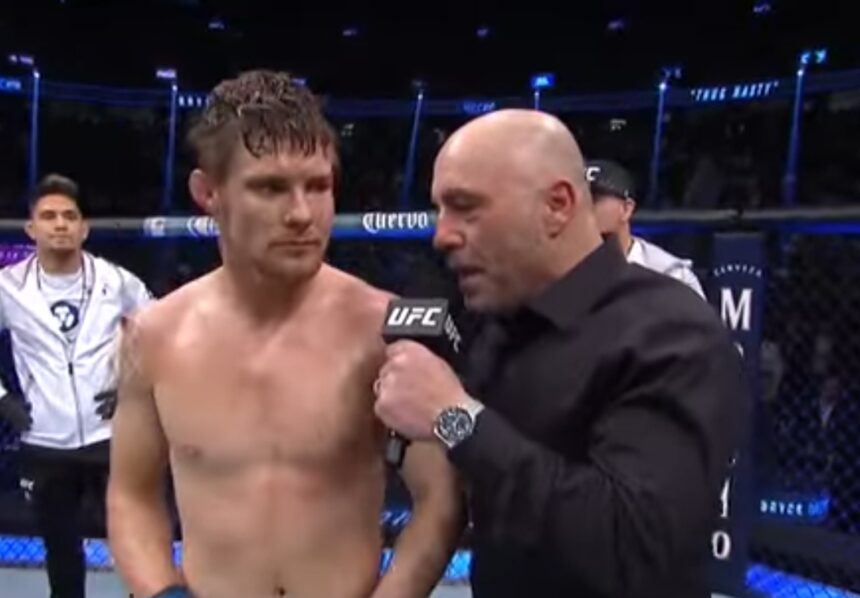UFC featherweight contender Bryce Mitchell has found himself at the center of a major controversy following highly offensive remarks made on his podcast, “ArkanSanity.” During the podcast’s inaugural episode, Mitchell referred to Adolf Hitler as a “good guy” and denied the Holocaust, making statements that have been widely condemned as anti-Semitic and historically inaccurate. These remarks have sparked outrage across the sports world, with many calling for strong repercussions against the fighter. The comments have drawn immediate backlash from fans, media, and fellow fighters, with UFC President Dana White strongly condemning the statements. However, despite the outrage, Mitchell is not expected to face disciplinary action from the UFC, citing the organization’s stance on freedom of speech. This decision has further fueled the controversy, as many believe such remarks should not be tolerated in professional sports.
During the first episode of his podcast “ArkanSanity,” Bryce Mitchell made statements that shocked the MMA community and beyond. In the episode, Mitchell denied the Holocaust and falsely claimed that Hitler was simply trying to “purify” Germany by expelling certain groups. He even went as far as to label Hitler as a “good guy,” which has been widely criticized as offensive and completely false. The Holocaust, one of the darkest events in human history, led to the deaths of over six million Jewish people and millions of others under Hitler’s Nazi regime. The overwhelming historical evidence and survivor testimonies directly contradict Mitchell’s claims, making his comments not only deeply offensive but also dangerously misleading. Mitchell’s remarks immediately went viral, with clips from his podcast circulating on social media platforms like Twitter, Instagram, and YouTube. The MMA community, sports journalists, and historians have all responded with widespread condemnation of his statements.
UFC President Dana White was quick to distance himself and the organization from Mitchell’s comments. At a recent press conference, White addressed the controversy, stating: “Those are some of the most ignorant and offensive comments I’ve ever heard. There is no defending this. Hitler was one of the most evil men in history, responsible for the deaths of millions. What Bryce Mitchell said was disgusting.” Despite his strong condemnation, White also confirmed that the UFC will not take disciplinary action against Mitchell, citing the organization’s policy on free speech. He emphasized that fighters are independent contractors and that while the UFC does not support or condone Mitchell’s comments, they will not punish him for expressing his views. This decision has sparked further debate in the MMA world, with some supporting White’s stance on free speech, while others argue that fighters should be held accountable for spreading harmful misinformation and hate speech.
The response from media outlets, sports journalists, and fans has been overwhelmingly negative. Major news organizations such as ESPN, The Guardian, and TalkSport have covered the controversy extensively, calling Mitchell’s remarks dangerous and irresponsible. MMA journalist Ariel Helwani, one of the sport’s most well-known reporters, criticized Mitchell’s comments, stating: “This is beyond unacceptable. Fighters have a platform, and with that comes responsibility. Denying historical facts and praising Hitler is not just ignorant—it’s offensive and deeply harmful.” Social media has been flooded with reactions, with the hashtag #CancelBryceMitchell trending on Twitter. Fans have called for Mitchell to be suspended or even removed from the UFC roster, arguing that allowing him to compete sends a dangerous message about what the organization is willing to tolerate. Some have also pointed out that other athletes have faced consequences for making controversial or offensive statements, questioning why Mitchell is not facing similar repercussions.
Regardless of whether the UFC takes official action, this controversy will likely have long-term effects on Bryce Mitchell’s career. The backlash could lead to loss of sponsorships and endorsement deals, as many brands and sponsors may distance themselves from Mitchell to avoid negative publicity. A tarnished reputation within the UFC and MMA community, even if he continues to fight, his image may be permanently damaged. Potential bans from media appearances, as many media platforms may choose not to interview him or promote his fights. Fan backlash and declining popularity, as fans who previously supported him may turn away due to his offensive remarks. While some of Mitchell’s hardcore supporters may continue to defend him, the overall response has been overwhelmingly negative, making it difficult for him to recover from this controversy.
This is not the first time that Bryce Mitchell has made controversial or bizarre statements. He has been known for publicly endorsing conspiracy theories, including claiming the U.S. government orchestrates mass shootings, suggesting that the COVID-19 pandemic was a hoax, and spreading misinformation about political events and global affairs. While some fans have previously dismissed his views as harmless eccentricity, this latest controversy has crossed a line that many believe is unacceptable.
Mitchell is not the first athlete to face backlash for offensive remarks. Several high-profile athletes have made controversial statements in the past, leading to severe consequences. Kyrie Irving—the NBA star was suspended and lost endorsements after promoting an anti-Semitic film. Colin Kaepernick—although his situation was different, his outspokenness led to being blacklisted from the NFL. Jon Jones—faced multiple controversies but managed to stay in the UFC, though with damaged credibility. These cases highlight the potential long-term consequences of controversial public statements. Some athletes have been able to repair their image over time, while others have faced permanent career setbacks.
Bryce Mitchell’s controversial Holocaust denial and pro-Hitler remarks have ignited one of the biggest scandals in UFC history. While the UFC has chosen not to take direct disciplinary action, the public backlash and media scrutiny could have lasting consequences on his career. Mitchell now faces a difficult road ahead. If he chooses to apologize and educate himself on historical facts, he may be able to begin repairing his reputation. However, if he continues to double down on his statements, he risks further alienating fans, losing sponsors, and permanently damaging his career. This controversy serves as a reminder of the power and responsibility that public figures hold. With a massive platform, athletes like Mitchell have the ability to influence thousands of people, and with that comes the duty to speak responsibly. Whether Mitchell will learn from this experience or continue down the path of controversy remains to be seen. For now, the MMA world watches closely as the fallout from his statements continues to unfold.






